人教版七年级英语下册第九单元知识点讲解
最新人教版七年级英语下册第九单元知识点讲解

Unit 9: What does he look like?一、词性转换1.curly反义词:straight2.tall反义词:short3.high名词:height4.thin反义词:fat5.glass复数:glasses6.act名词:actor actress7.sing名词:singer 8.describe名词:description9.different 副词:differently 名词:difference 10.real副词:really11.big反义词:smallExercise 1:二、重点词汇1. a little bit & a little & a bit1) 修饰形容词或副词时,三者可通用,但a little bit比后两者所表示的程度稍弱一点。
Today is a little bit / a little / a bit cold. 今天有点冷。
2)修饰不可数名词时,a little直接跟不可数名词,a bit需加of再跟不可数名词。
There is a little / a bit of water in the glass. 杯子里有点水。
3)a little 和a bit在否定句中意思恰恰相反。
not a little相当于very “很,非常”,not a bit相当于not….at all“一点也不”。
① He is not a little hungry. = He is very hungry. 他很饿。
② He is not a bit hungry. = He isn’t hungry at all. 他一点也不饿。
2. stop to do sth. “停下来去做某事”。
指停止原来做的事情,去做另一件事情。
stop doing sth. “停止做某事”,指停止正在做的事情,即不做某事了。
E.g. He stops to do his homework.He stops doing his homework.Class begins, please stop talking.We are all tired, stop to have a rest.3. remember/forget doing sth. 记得/忘记做过某事(事情已做)remember/forget to do sth. 记得/忘记要去做某事(事情还没做)E.g. Please remember to eat lunch.I am sorry, I forget to my homework.I remember playing computer with my sister yesterday.I forget calling you.4. no more & not….any more & no longer & not….any longer1) no more = not….any more表示数量和程度的“不再(增加)”,常修饰终止性动词。
Unit 9 单元复习知识点课件 人教版英语七年级下册

-- _________.
A. He is thin
B. She is a kind girl
C. She likes music D. She has good-looking
4. -- Lucy doesn’t have curly hair.
-- Yes, we can say she has _______hair.
There are a lot of people in the bus. 公共汽车上有很多人。
3. Also, they don’t always remember well. 而且,他们并不总是记得牢靠。
(1)当also用于句首时,其后往往有逗号与句 子的剩余部分隔开。这时,also用于修饰整 个句子,相当于汉语中“同时;还;而且”。
Unit 9 What does he look like?
单元复习知识点课件
Key sentences for describing people: (描述人的重点句型)
What does he/she look like? 1) He/She is of medium height/tall/short
A. How old is he
B. What does he do
C. What does he look like D. How is he
8. --Tom is not very heavy.
--Yes, I think we can say he is ______ heavy.
A. a little
Ⅰ.补全句子。
1. 他长得什么样?
_W___h_a_t_ __d_o_e_s__ he ___lo_o__k_ __l_ik__e__?
人教版七年级下册英语第九单元知识点

人教版七年级下册英语第九单元知识点人教版七年级下册英语第九单元的知识点主要涉及到短语、句型和语法规则。
常用短语:1. go hiking:去远足2. go shopping:去购物3. go swimming:去游泳4. go fishing:去钓鱼5. go sightseeing:去观光6. have a picnic:野餐7. on vacation:度假8. take photos:拍照9. have fun:玩得愉快10. make a plan:制定计划常用句型:1. What are you doing this weekend?:你这个周末要做什么?2. I am going to…:我打算去…3. Are you free…?:你…有空吗?4. Yes, I am.:是的,我有空。
5. No, I'm not.:不,我没空。
6. Can I help you?:我能帮你吗?7. Sure. I need…:当然,我需要…语法规则:1. 表示将来的时间状语:this weekend(这个周末)、nextweek(下周)、tomorrow(明天)等。
2. 表示将来计划的时候,使用“I am going to…”句型。
3. 表示将来打算的动词一般使用原形。
例句:1. What are you doing this weekend? - I am going hiking with my friends.(你这个周末要做什么?- 我要和我的朋友们去远足。
)2. Are you free tomorrow? - Yes, I am. Let's go fishing in the lake. (你明天有空吗?- 是的,我有空。
我们去湖里钓鱼吧。
)3. Can I help you? - Sure. I need to buy some clothes for the party. (我能帮你吗?- 当然,我需要为聚会买些衣服。
人教版七年级英语下册第九单元知识点讲解教学内容
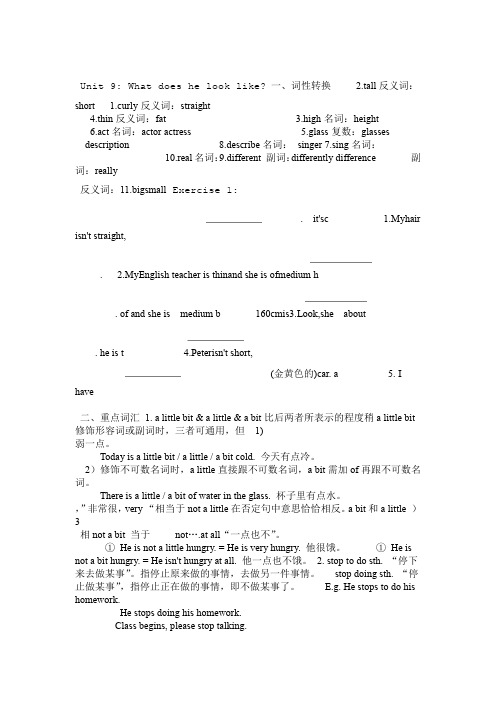
Unit 9: What does he look like? 一、词性转换 2.tall反义词:short 1.curly反义词:straight4.thin反义词:fat 3.high名词:height6.act名词:actor actress 5.glass复数:glasses description 8.describe名词:singer7.sing名词:10.real名词:9.different 副词:differently difference 副词:really反义词:11.bigsmall Exercise 1:. it'sc 1.Myhair isn't straight,. 2.MyEnglish teacher is thinand she is ofmedium h. of and she is medium b 160cmis3.Look,she about. he is t 4.Peterisn't short,(金黄色的)car. a 5. I have二、重点词汇1. a little bit & a little & a bit比后两者所表示的程度稍a little bit 修饰形容词或副词时,三者可通用,但1)弱一点。
Today is a little bit / a little / a bit cold. 今天有点冷。
2)修饰不可数名词时,a little直接跟不可数名词,a bit需加of再跟不可数名词。
There is a little / a bit of water in the glass. 杯子里有点水。
,”非常很,very “相当于not a little在否定句中意思恰恰相反。
a bit和a little )3相not a bit 当于not….at all“一点也不”。
①He is not a little hungry. = He is very hungry. 他很饿。
人教版丨七年级下册英语9单元知识点总结

人教版丨七年级下册英语9单元知识点总结Unit 9单词(音标)curly ['kɜː(r)li] adj. 卷曲的straight [streɪt] adj.直的tall [tɔːl] adj. 高的medium ['miːdɪəm] adj.中等的height [haɪt] n.身高;高度(be) of medium height中等身高thin [θɪn] adj.瘦的heavy ['hevi] adj. 重的build [bɪld] v.身材(be) of medium build 中等身材tonight [tə'naɪt] adv.&n.(在)今晚;(在)今夜little ['lɪtl] adj. 小的a little一点儿,少量cinema ['sɪnɪmə] n.电影院glasses ['glɑ:sɪz](pl.)n. [轻] 眼镜later ['leɪtə(r)] adv.以后handsome ['hænsəm] adj.英俊的actor ['æktə(r)] n.演员actress ['æktrəs] n. 女演员person ['pɜː(r)sn] n. 人nose [nəʊz] n. 鼻子blonde [blɒnd] adj.(头发)金黄色的mouth [maʊθ] n.嘴round [raʊnd] adj. 圆形的face [feɪs] n. 脸eye [aɪ] n. 眼睛singer ['sɪŋə(r)] n. 歌手artist ['ɑː(r)tɪst] n. 艺术家crime [kraɪm] n.犯罪活动criminal ['krɪmɪnl] n. 罪犯put [pʊt] v. 放each [iːtʃ] adj. &pron. 每个;各自way [weɪ] n.方式;路线describe [dɪ'skraɪb] v.描述differently ['dɪfərəntli] adv. 不同地another [ə'nʌðə(r)] adj.&pron. 另一;又一end [end] n. 结尾;尽头in the end最后real [rɪəl] adj.真正的;真实的jeans [dʒi:nz] n. 牛仔裤Johnny ['dʒɒni]约翰尼(男名)Dean [di:n]迪安(姓)Tina ['ti:nə]蒂娜(女名)Jackson ['dʒæksən] 杰克逊(姓)Unit9 知识梳理【重点短语】1. look like 看起来像2. short/long/curly/straighthair短/长/卷/直发2. medium height 中等身高3. medium build 中等身材4. be a little late 有点儿晚5. wear glasses 戴眼镜6. See you later then. 那么回头见。
人教版七年级下册英语第九单元Unit 9 What does he look like单元重点语法归纳
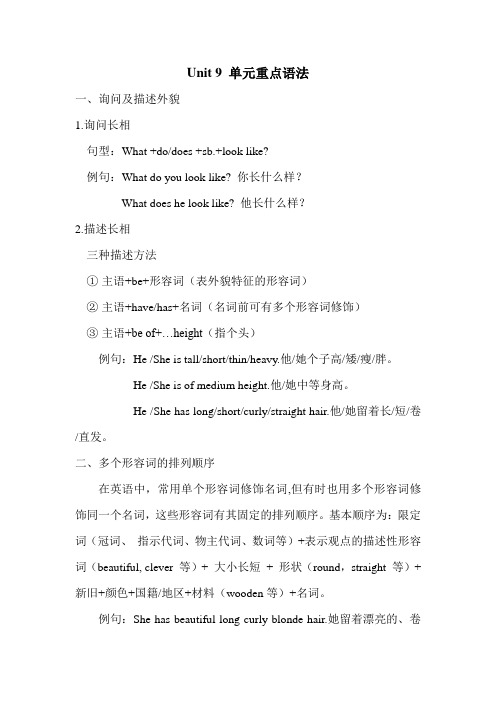
Unit 9 单元重点语法
一、询问及描述外貌
1.询问长相
句型:What +do/does +sb.+look like?
例句:What do you look like? 你长什么样?
What does he look like? 他长什么样?
2.描述长相
三种描述方法
①主语+be+形容词(表外貌特征的形容词)
②主语+have/has+名词(名词前可有多个形容词修饰)
③主语+be of+…height(指个头)
例句:He /She is tall/short/thin/heavy.他/她个子高/矮/瘦/胖。
He /She is of medium height.他/她中等身高。
He /She has long/short/curly/straight hair.他/她留着长/短/卷/直发。
二、多个形容词的排列顺序
在英语中,常用单个形容词修饰名词,但有时也用多个形容词修饰同一个名词,这些形容词有其固定的排列顺序。
基本顺序为:限定词(冠词、指示代词、物主代词、数词等)+表示观点的描述性形容词(beautiful, clever 等)+ 大小长短+ 形状(round,straight 等)+新旧+颜色+国籍/地区+材料(wooden等)+名词。
例句:She has beautiful long curly blonde hair.她留着漂亮的、卷
曲的、金色的长发。
I have a lovely small white France cat.我有一只可爱的,来自法国的小白猫。
形容词的排列顺序:
大小、形状、描述性,年龄、颜色后跟定;产地、材料和用途,先后顺序已排清。
人教版七年级英语下册 Unit9 What does he look like单元知识点总结

Unit 9 What does he look like?一、短语归纳short hair 短发long hair 长发curly hair 卷发straight hair 直发be of medium height 中等身高be of medium build 中等身材a little 一点;少量look like 看起来像 a big nose 大鼻子a small mouth 小嘴巴 a round face 圆脸big eyes 大眼睛a long face 长脸the same way 同样的方式in the end 最后first of all 首先二、词组用法归纳1、”be going to” 表将来:主语+ be + going to do sth 某人打算做某事Ex:We are going to visit the Great Wall tomorrow. 明天我们打算去长城游玩。
4、小练:--- Hurry up! The movie is beginning.--- Don’t worry. There is still time left.A. littleB. a littleC. a few5、each:做形容词时,修饰可数名词单数,意为“每个;各自”Ex:Each school has its own library. 每一所学校都有它自己的图书馆。
三、语法归纳(一)询问及描述外貌:1、询问外貌:What do/ does sb look like? 某人长什么样?2、描述人的外貌的句型如下:(1)表示某人的个头或身材:主语+ be of +形容词+ height/ build.Ex:Our math teacher is of medium build. 我们的数学老师是中等身材。
(2)表示某人的高矮胖瘦:主语+be +形容词.Ex:She is short and thin. 她很瘦小。
Unit9笔记人教版七年级英语下册

七下Unit9笔记(人教版)Unit 9 What does he look like?Section A1.What does he look like? “他长什么样?”英语中询问外貌的结构为:What do/does + 人+ look like?如若要询问人的品格则用:What + be动词+ 人+ like?Eg: (1) What does your sister look like?“你姐姐长什么样?”She is thin and has long hair.“她很瘦并且长着长头发。
”(2) What is your sister like?“你姐姐是个怎样的人?”She is kind and friendly.“她很善良友好。
”2.Short hair/long hair/curly hair/straight hair 短发/长发/卷发/直发3.Short (形容词) “短的/矮的”Eg: The ruler is very short.“这把尺很短。
”Lily is very short.“丽丽长得很矮。
”4.Of medium height “中等个”Height (名词) “高度” 对应的形容词形式为:high (形容词) “高的”5.Medium build “中等身材”Build (名词) “身材、体格” (动词) “建造;建筑”其作动词时的对应名词形式为:building (名词) “建筑物”6.Go to the movie “去电影院”7.Meet (动词) “集合;见面;碰头”其派生词为:meeting (名词) “会议” have a meeting “开会”Eg: We will meet at the airport.“我们将在机场见面。
”8.Right 可译为“对的;是吧”也可译为“右面的;在右面”Eg: You are right.“你是正确的。
人教版七年级英语下册第九单元知识点汇总总结
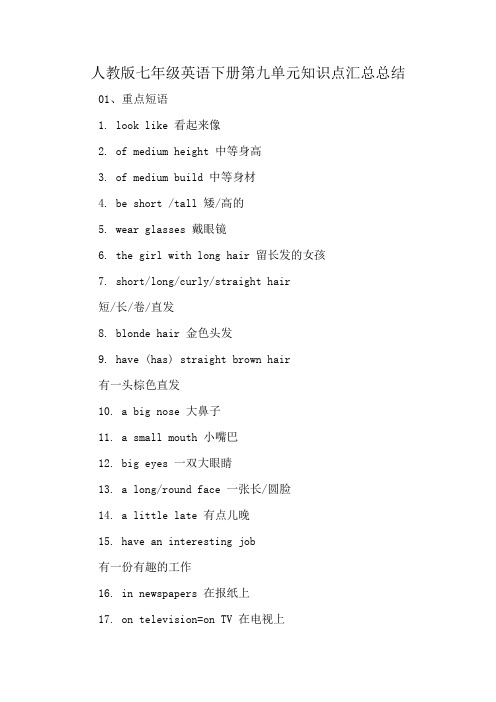
人教版七年级英语下册第九单元知识点汇总总结01、重点短语1. look like 看起来像2. of medium height 中等身高3. of medium build 中等身材4. be short /tall 矮/高的5. wear glasses 戴眼镜6. the girl with long hair 留长发的女孩7. short/long/curly/straight hair短/长/卷/直发8. blonde hair 金色头发9. have (has) straight brown hair有一头棕色直发10. a big nose 大鼻子11. a small mouth 小嘴巴12. big eyes 一双大眼睛13. a long/round face 一张长/圆脸14. a little late 有点儿晚15. have an interesting job有一份有趣的工作16. in newspapers 在报纸上17. on television=on TV 在电视上18. police artist 警局绘画师19. each criminal 同一个罪犯20. draw a picture of the criminal画一个罪犯的像21. describe the same person differently同一个人描述得不一样22. real criminal 真正的罪犯23. in the end 最后24. first of all 首先;第一25. wear jeans 穿牛仔裤26. wear sports shoes 穿运动鞋02、重点句子Grammar Focus 句子1. ——What does he look like?他长什么样?——He's really tall.他长得确实高。
2. ——What does she look like?她长什么样?——She has long straight hair.她留着长直发。
人教版英语七年级下册单元Unit 9 知识点+测试卷+思维导图
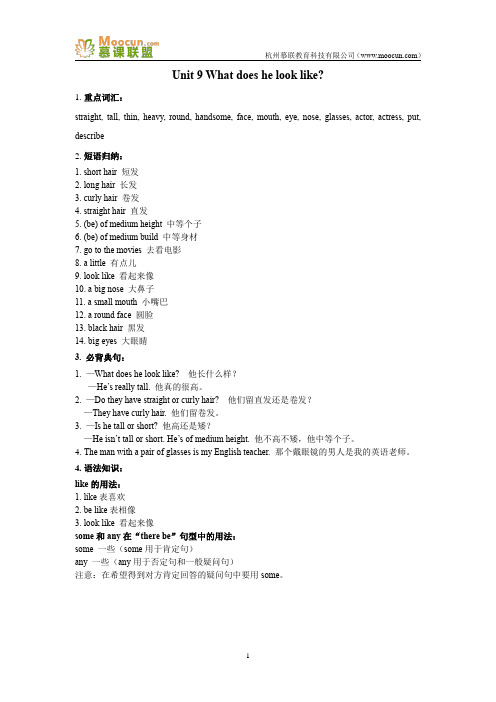
Unit 9 What does he look like?1.重点词汇:straight, tall, thin, heavy, round, handsome, face, mouth, eye, nose, glasses, actor, actress, put, describe2.短语归纳:1. short hair 短发2. long hair 长发3. curly hair 卷发4. straight hair 直发5. (be) of medium height 中等个子6. (be) of medium build 中等身材7. go to the movies 去看电影8. a little 有点儿9. look like 看起来像10. a big nose 大鼻子11. a small mouth 小嘴巴12. a round face 圆脸13. black hair 黑发14. big eyes 大眼睛3. 必背典句:1. —What does he look like? 他长什么样?—He’s really tall. 他真的很高。
2. —Do they have straight or curly hair? 他们留直发还是卷发?—They have curly hair. 他们留卷发。
3. —Is he tall or short? 他高还是矮?—He isn’t tall or short. He’s of medium height. 他不高不矮,他中等个子。
4.The man with a pair of glasses is my English teacher. 那个戴眼镜的男人是我的英语老师。
4.语法知识:like的用法:1. like表喜欢2. be like表相像3. look like 看起来像some和any在“there be”句型中的用法:some 一些(some用于肯定句)any 一些(any用于否定句和一般疑问句)注意:在希望得到对方肯定回答的疑问句中要用some。
人教版七年级下册英语第九单元笔记

一、单词和短语总结1.1 单词1. celebrate2. delicious3. tradition4. greet5. custom1.2 短语1. have a big dinner2. get together3. light fireworks4. give lucky money5. wear new clothes二、重点语法总结2.1 时态1. 一般现在时2. 一般将来时3. 过去时2.2 代词1. 主格代词2. 宾格代词3. 物主代词2.3 形容词比较级和最高级1. 原级2. 比较级3. 最高级三、课文重点梳理3.1 第一部分1. 课文主题介绍2. 新年庆祝活动3.2 第二部分1. 不同国家的庆祝方式2. 我国的传统庆祝方式3.3 第三部分1. 朋友间的交流2. 探讨新年的意义四、生词表4.1 生词1. traditional2. connect3. global4. spring5. develop4.2 生词解析1. traditional(adj. 传统的)2. connect(v. 通联)3. global(adj. 全球的)4. spring(n. 春天)5. develop(v. 发展)五、课文内容分析5.1 内容一1. 课文主题2. 新年庆祝活动介绍5.2 内容二1. 不同国家的庆祝方式2. 我国的传统庆祝方式5.3 内容三1. 朋友间的交流和交往2. 探讨新年的意义六、语法要点解析6.1 时态1. 一般现在时用法2. 一般将来时用法3. 过去时用法6.2 代词1. 主格代词的用法2. 宾格代词的用法3. 物主代词的用法6.3 形容词比较级和最高级1. 原级的用法2. 比较级的用法3. 最高级的用法七、课文练习答案7.1 课后练习一1. A2. C3. B4. D5. B7.2 课后练习二1. C2. A3. B4. D5. A八、课文感悟8.1 对课文的理解1. 新年庆祝活动的普遍性2. 不同国家的庆祝方式8.2 对语法要点的掌握1. 时态的正确应用2. 代词和形容词比较级和最高级的灵活运用九、课文拓展9.1 外部拓展1. 阅读其他国家的新年庆祝方式2. 观看相关电影或纪录片深入了解不同文化的庆祝习俗9.2 内部拓展1. 讨论当地的传统节日庆祝方式2. 撰写关于自己喜欢的节日的文章共享给同学十、课文总结本单元主要介绍了新年庆祝活动以及不同国家的庆祝方式,通过学习,我们不仅了解了其他国家的传统习俗,还加深了对时态、代词和形容词比较级和最高级等语法知识的掌握。
七年级下册英语第九单元知识点(人教版)

Unit 9 How was your weekend?一、词组1.do one’s homework=do homework 做某人的家庭作业(do my homework 做我的家庭作业)2.play +运动或棋类(如:play soccer 踢足球play chess 下棋)3.play +the+乐器(如:play the guitar 弹吉他)4.clean my room 打扫我的房间5.go to the beach 去海滩6.go to the movies 去看电影7. on Saturday morning周六上午(in the morning/afternoon/evening 在早上/在下午/在晚上)[介词(prep): ① on + 具体的星期几/ 日期Eg: on Sundays/ July 7② in + 月/年/季节/世纪Eg; in July/ 2006/ summer/ 21century③ at + 具体钟点Eg; at 7:00]8. visit sb 拜访某人(visit my friend 看望我的朋友)9. study for the (math) test 准备(数学)考试10. do some reading 阅读(do+some+ving表示动作)[do some washing洗衣服do some cooking做饭do some shopping购物]11. stay at home 呆在家里12. have a party 举行一个晚会13. practice English 练习英语[practice (practiced) doing sth 练习做某事(类似用法:like, enjoy, have fun)]14.study geography 学习地理15. go shopping 去购物(go+v.ing 表示“去做某事”)[go swimming去游泳go boating去划船go climbing 去爬山]16. play computer games 玩电脑游戏17. go to summer camp 去夏令营18. go to the mountains 去爬山19. go for a walk 散步20.read a book about history 读一本历史书21.see an interesting talk show 看一个有趣的访谈节目22.write a new song 写一首新歌23. spend the weekend 度假[spend (spent) sometime / money (in) doing sth花费时间/金钱做某事spend (spent) sometime / money on sth 在某事上花费时间/金钱做某事]24. look for 寻找(的动作)find (found) 寻找(的结果)[Eg: I looked for everywhere but I couldn’t find my key.我找了所有的地方,都没有找到我的钥匙。
Unit 9 Section B 知识点讲解与练习 人教版七年级英语下册

人教版初中英语七年级下册unit 9 Section B 知识点讲解与练习一.artist singer 表职业单词1. 动词+ er/or (表示职业或身份的)名词teach v.教——teacher n. 老师,教师sing v. 唱——singer n. 歌手dance v.跳舞——dancer n. 舞者,舞蹈家clean v.打扫_cleaner n. 清洁工act v. 表演,行动——actor n. 男演员work v. 工作——worker n. 工人wait v.等待——waiter n. 男服务员2.名词+ ist (表示职业或身份的)名词piano n. 钢琴——pianist n. 钢琴家violin n. 小提琴——violinist n. 小提琴家art n.艺术——artist n. 艺术家science n.科学——scientist n. 科学家二.round1.adj. 圆形的The earth is round. 地球是圆的。
The little girl has a round face. 这个小女孩长着一张圆圆的脸。
2.adv. 迂回地,在周围。
He stood there looking all round. 他站在那儿环顾四周。
adv. moving in a circle 旋转;环绕;兜圈子Everybody joins hands and dances round.大家手拉着手,围成一圈跳舞。
How do you make the wheels go round?你是怎么让轮子转起来的?3.prep. 围绕,环绕,大约。
They sat round the table. 他们围桌而坐。
三..face1. n.脸Anger showed in his face. 他的脸上露出了怒容。
2. v. 面对,面向,朝向。
We should face the problem bravely. 我们应该勇敢地面对困难。
人教版七年级下册英语Unit9单元语法知识点总结
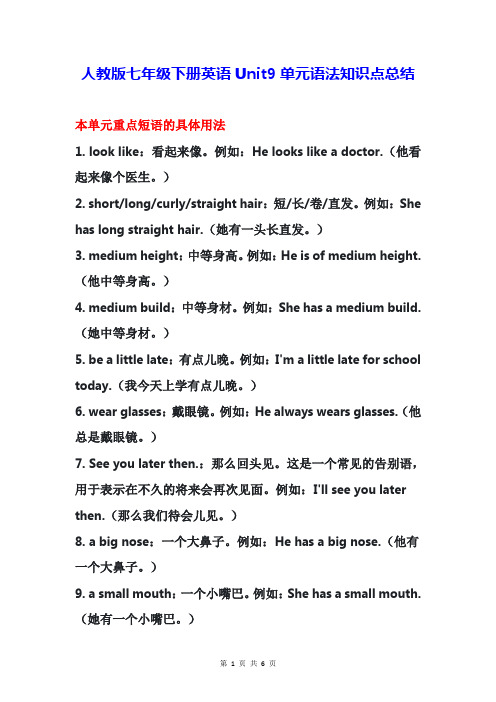
人教版七年级下册英语Unit9单元语法知识点总结本单元重点短语的具体用法1. look like:看起来像。
例如:He looks like a doctor.(他看起来像个医生。
)2. short/long/curly/straight hair:短/长/卷/直发。
例如:She has long straight hair.(她有一头长直发。
)3. medium height:中等身高。
例如:He is of medium height.(他中等身高。
)4. medium build:中等身材。
例如:She has a medium build.(她中等身材。
)5. be a little late:有点儿晚。
例如:I'm a little late for school today.(我今天上学有点儿晚。
)6. wear glasses:戴眼镜。
例如:He always wears glasses.(他总是戴眼镜。
)7. See you later then.:那么回头见。
这是一个常见的告别语,用于表示在不久的将来会再次见面。
例如:I'll see you later then.(那么我们待会儿见。
)8. a big nose:一个大鼻子。
例如:He has a big nose.(他有一个大鼻子。
)9. a small mouth:一个小嘴巴。
例如:She has a small mouth.(她有一个小嘴巴。
)10. big eyes:大眼睛。
例如:She has big eyes.(她有一双大眼睛。
)11. blonde hair:金黄色的头发。
例如:Her blonde hair shines in the sun.(她的金黄色头发在阳光下闪耀。
)12. a long face:一个长脸。
例如:He has a long face.(他有一个长脸。
)13. have an interesting job:有一份有趣的工作。
人教版七年级下册英语第九单元基础知识点

人教版七年级下册英语第九单元基础知识点Unit9 What does he look like?【重点单词】curly adj.卷曲的straight adj.直的tall adj.高的medium adj. 中等的height n.身高;高度of medium height 中等身高thin adj.瘦的heavy adj.重的build n.身材of medium build 中等身材tonight adv.&n.今夜little adj.小的a little 一点,少量cinema n.电影院glasses n.眼镜later adj.以后handsome adj.英俊的actor n.演员actress n.女演员person n.人nose n.鼻子blonde adj.金黄色的mouth n.嘴round adj.圆形的face n.脸eye n.眼睛singer n.歌手artist n.艺术家crime n.犯罪活动criminal n.罪犯put v.放each adj.&pron.每个,各自way n.方式,路线describe v.描述differently adv.不同地another adj.&pron另一,又一end n.结尾,尽头in the end 最后real adj.真正的;真实的jeans n.牛仔裤【重点短语】1.short hair短发2.long hair长发3.curly hair卷发4.straight hair直发5.(be)of medium height中等个子6.(be)of medium build中等身材7.go to the movies去看电影8.a little有点儿9.look like看起来像10.a big nose大鼻子11.a small mouth小嘴巴12.a round face圆脸13.black hair黑发14.big eyes大眼睛15.a long face长脸16.the same way同样的方式17.in the end最后18.blonde hair金黄色的头发【重点句型】1.I may be a little late.我或许要晚一会儿。
人教版七年级下册英语unit9单词讲解
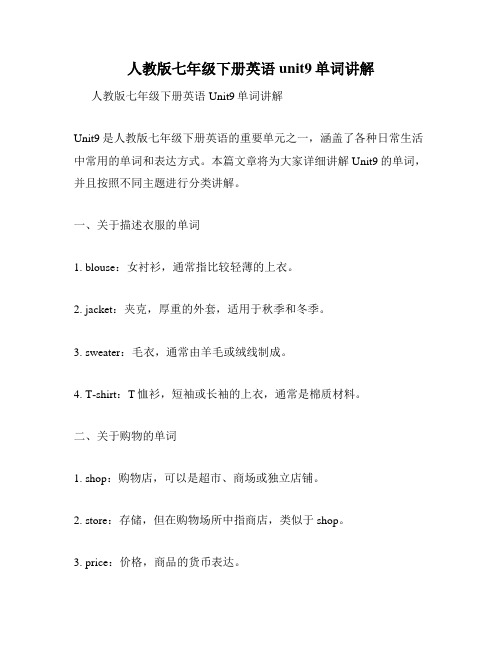
人教版七年级下册英语unit9单词讲解人教版七年级下册英语Unit9单词讲解Unit9是人教版七年级下册英语的重要单元之一,涵盖了各种日常生活中常用的单词和表达方式。
本篇文章将为大家详细讲解Unit9的单词,并且按照不同主题进行分类讲解。
一、关于描述衣服的单词1. blouse:女衬衫,通常指比较轻薄的上衣。
2. jacket:夹克,厚重的外套,适用于秋季和冬季。
3. sweater:毛衣,通常由羊毛或绒线制成。
4. T-shirt:T恤衫,短袖或长袖的上衣,通常是棉质材料。
二、关于购物的单词1. shop:购物店,可以是超市、商场或独立店铺。
2. store:存储,但在购物场所中指商店,类似于shop。
3. price:价格,商品的货币表达。
4. discount:折扣,通常由商家提供,用于吸引顾客购买。
三、关于生活用品的单词1. towel:毛巾,通常用于洗脸、洗手、擦拭身体和吹干头发。
2. toothbrush:牙刷,用于清洁牙齿的刷子。
3. soap:肥皂,用于清洁身体。
4. shampoo:洗发水,用于清洗头发。
四、关于街道和建筑的单词1. mall:商场,有不同种类的商店,包括服装店、食品店和电子店等等。
2. sidewalk:人行道,通常位于道路两侧,供行人走路。
3. crosswalk:人行横道,用于行人安全通过道路。
4. department store:百货公司,供应各种商品。
五、关于餐厅的单词1. menu:餐厅菜单,通常用于选择餐厅菜品。
2. waiter/waitress:服务员,帮助客人点餐并提供服务。
3. order:点菜,选择菜品并告知服务员。
4. bill/check:账单,由服务员提供,通常包含客人所点菜品和价格。
以上是Unit9单元的一些重要单词及其意义,掌握这些单词将有助于您在日常生活中更好的理解英语表达方式。
人教版七年级下册英语Unit 9 知识点语法归纳总结

Unit 9 What dose he look like?1.短语归纳2.典句必背3.用法集萃(1)What does he look like? 他长什么样?❖“What+do/ does+主语+look like?” 句型用于询问人的外貌特征。
回答时常用描述外貌的形容词,可用“主语+be动词+形容词”句式,也可用“主语+have/ has+形容词+名词”句式进行描述。
例:—What does your brother look like? 你哥哥长什么样?—He is tall and thin./He has short curly hair.他又高又瘦/他有一头短短的卷发❖在英语中,询问性格通常用“What+be动词+主语+like?”的句式。
例:—What is your new teacher like? 你的新老师是什么样的人?—She is very strict. 她很严厉牛刀小试—What does your math teacher _______ ?—He is of medium height and young.A.look atB.look afterC.look forD.look like(2)Are you going to the movie tonight? 你今天晚上去看电影吗?❖本句是“be going to+地点或场所” 的句式结构,表示“打算/将要去某地或某场所”例:We are going to Hong Kong next month. 我们下个月打算去香港Are you going to Lisa's birthday party? 你打算去参加莉萨的生日聚会吗?❖拓展:be going to do sth.是一般将来时的结构,表示“计划/打算做某事”。
例:They are going to travel around Europe. 他们打算环游欧洲(3)Yeah, but I may be a little late.对,但是我可能会晚到一点①本句中的may是情态动词,意为“可能;或许”,表示推测。
人教版七年级下册英语Unit-9--What-does-he-look-like-知识点
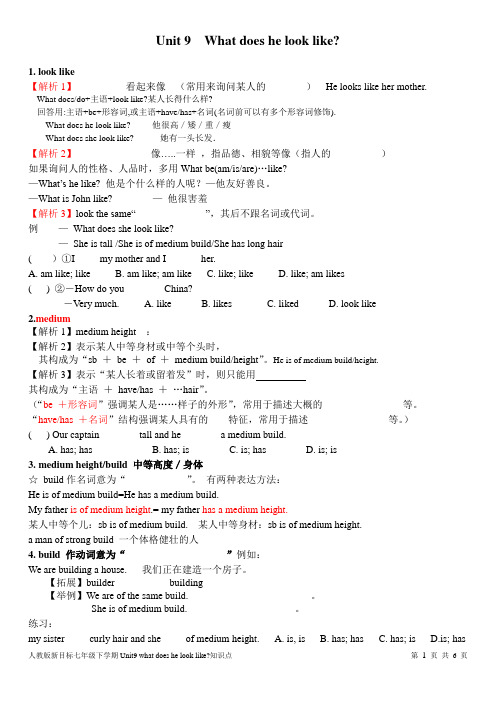
Unit 9 What does he look like?1. look like【解析1】看起来像(常用来询问某人的)He looks like her mother.---What does/do+主语+look like?某人长得什么样?回答用:主语+be+形容词,或主语+have/has+名词(名词前可以有多个形容词修饰).---What does he look like? ---他很高/矮/重/瘦---What does she look like? ---她有一头长发.【解析2】像…..一样,指品德、相貌等像(指人的)如果询问人的性格、人品时,多用What be(am/is/are)…like?—What’s he like? 他是个什么样的人呢?—他友好善良。
—What is John like? —他很害羞【解析3】look the same“”,其后不跟名词或代词。
例—What does she look like?—She is tall /She is of medium build/She has long hair( )①I ____ my mother and I ______ her.A. am like; likeB. am like; am likeC. like; likeD. like; am likes( ) ②-How do you _______ China?-Very much. A. like B. likes C. liked D. look like2.medium【解析1】medium height:【解析2】表示某人中等身材或中等个头时,其构成为“sb +be +of +medium build/height”。
He is of medium build/height.【解析3】表示“某人长着或留着发”时,则只能用其构成为“主语+have/has +…hair”。
人教版英语七年级下册第九单元短语语法知识点总结说课讲解

Unit 9What does he look like?【短语归纳】1. short hair 短发2. long hair 长发3. curly hair 卷发4. straight hair 直发5. (be) of medium height 中等个子6. (be) of medium build 中等身材7. go to the movies 去看电影8. a little 有点儿9. look like 看起来像10. a big nose 大鼻子11. a small mouth 小嘴巴12. a round face 圆脸13. black hair 黑发14. big eyes 大眼睛15. a long face 长脸16. the same way 同样的方式17. in the end 最后18. blonde hair 金黄色的头发【用法集萃】1. What does / do + 主语+ look like? ……看上去什么样?2. sb. + be + of + medium build / height 某人中等身材/ 个子3. sb. + has +… hair 某人留着……发┃语法探究┃Ⅰ.形容词的排列顺序在英语中,当名词有多个形容词修饰时,就有它们的先后顺序。
下面的口诀可帮你记住这一先后顺序:限定描绘大、长、高,形状、年龄和新老;颜色、国籍跟材料,作用、类别往后靠。
注解1: “限定词”包括:冠词、物主代词、指示代词和数词,它位于各类形容词前。
它本身分为三位,即:前、中、后。
前位限定词有all、half、both、分数和倍数;中位限定词有冠词、指示代词、物主代词等;后位限定词有基数词和序数词,但序数词位于基数词前。
如:both my hands; all his income.注解2: “描绘”性形容词。
如:beautiful、bad、cold、great等。
- 1、下载文档前请自行甄别文档内容的完整性,平台不提供额外的编辑、内容补充、找答案等附加服务。
- 2、"仅部分预览"的文档,不可在线预览部分如存在完整性等问题,可反馈申请退款(可完整预览的文档不适用该条件!)。
- 3、如文档侵犯您的权益,请联系客服反馈,我们会尽快为您处理(人工客服工作时间:9:00-18:30)。
Unit 9: What does he look like?一、词性转换1.curly反义词:straight2.tall反义词:short3.high名词:height4.thin反义词:fat5.glass复数:glasses6.act名词:actor actress7.sing名词:singer8.describe名词:description9.different 副词:differently 名词:difference 10.real副词:really11.big反义词:smallExercise 1:二、重点词汇1. a little bit & a little & a bit1) 修饰形容词或副词时,三者可通用,但a little bit比后两者所表示的程度稍弱一点。
Today is a little bit / a little / a bit cold. 今天有点冷。
2)修饰不可数名词时,a little直接跟不可数名词,a bit需加of再跟不可数名词。
There is a little / a bit of water in the glass. 杯子里有点水。
3)a little 和a bit在否定句中意思恰恰相反。
not a little相当于very “很,非常”,not a bit相当于not….at all“一点也不”。
① He is not a little hungry. = He is very hungry. 他很饿。
① He is not a bit hungry. = He isn’t hungry at all. 他一点也不饿。
2. stop to do sth. “停下来去做某事”。
指停止原来做的事情,去做另一件事情。
stop doing sth. “停止做某事”,指停止正在做的事情,即不做某事了。
E.g. He stops to do his homework.He stops doing his homework.Class begins, please stop talking.We are all tired, stop to have a rest.3. remember/forget doing sth. 记得/忘记做过某事(事情已做)remember/forget to do sth. 记得/忘记要去做某事(事情还没做)E.g. Please remember to eat lunch.I am sorry, I forget to my homework.I remember playing computer with my sister yesterday.I forget calling you.4. no more & not….any more & no longer & not….any longer1) no more = not….any more表示数量和程度的“不再(增加)”,常修饰终止性动词。
We won’t go there any more.我们不再去那里了。
The baby watched and listened, and she cried no more.那个婴儿看着、听着,不再哭了。
2) no longer = not….any longer表示时间上“不再(延长)”,常修饰延续性动词。
He no longer lives here. 他不再住在这儿了。
You can’t stay here any longer.你不能再留在这儿了。
5. wear & put on & have on & dress1) wear是“穿着”“戴着”的意思,强调状态。
常用一般现在时表示经常状态,用进行时态表示暂时状态。
wear还可用来表示佩戴手表、首饰、徽章、花儿的“佩”或“戴”以及留头发,胡须的“留”。
2) put on是“穿上”“戴上”,强调动作,是终止性动词短语,不能跟表示一段时间的状语连用。
3) have on意为“穿着”“戴着”,与wear同义,指穿的状态,其后可以接表示衣服、帽子、鞋子的名词。
have on不用于进行时态。
4) dress “使......穿着,装扮,打扮”dress sb/ dress sb in +衣服。
dress后面不能直接跟衣服。
Exercise 2:1. He always ______ black trousers and he always ______ his son in black.A. dress; dressB. wears; puts onC. wears; dressesD. puts on; wears2. He likes _______ the red coat.A. wearingB. wearsC. putting onD. dressing三、短语归纳1. look like2. short hair3. curly hair4. medium height5. medium build6. a little7. a big nose8. a small mouth9. a round face10. a police artist11. a picture of the criminal12. in the end13. be good at14. go to the movie15. black hair16.a long face17.long hair18.straight hair19.big eyes20.the same way21.blonde hairExercise 3:四、基础句型1. 询问及描述某人的外貌特征问:What do/does + 主语+ look like? “……看上去什么样?”/ “……长什么样?”答:主语+ be + 形容词。
(强调某人是……样子的外形,常用于描述大概的体形、身高等。
)主语+ have/has + 形容词+ 名词(强调某人的相貌特征,常用于描述五官、相貌等)。
主语+ be of +名词(指描述某人的体形、身材等)E.g. What does your friend look like?He is short and thin.He has short, black hair.She is of medium build.【拓展】be like像……一样,指品德、相貌等像(指人的个性特征)如果询问人的性格、人品时,多用What be(am/is/are)…like?E.g. —What’s he like? 他是个什么样的人呢?—He’s friendly and kind. 他友好善良。
Exercise 4:1. —What do you look like?—I’m ________.A. tiredB. tallC. kindD. happy2. 用be与have的适当形式填空1) She ____________ tall and thin.2) Jim ____________ small nose and big eyes.3)He ____________ of medium height.4) She ____________ a little bit short and ____________ big eyes.5) Does she ____________ long hair?2.She is of medium build, and she has long straight hair. 她身材适中,留着长发。
【解析1】medium build 中等身材1) build作名词意为“体格,体型”。
有两种表达方法:E.g. He is of medium build. = He has a medium build.2) build 作动词意为“建造,建设,建立”。
E.g. We are building a house.【解析2】表示“某人长着或留着发”时,则只能用has/have其构成为:“主语+have/has +…hair”。
E.g. He has short hair.五、语法总结1. 形容词的顺序一般与被修饰形容词关系密切的形容词靠近名词; 如果几个形容词的重要性差不多, 可参照下表:限定词+数量词(序数词在前, 基数词在后)+ 描绘性状形容词+大小、长短、高低等形体+名词规则:限定描绘大长高,形状年龄和新老;颜色国籍跟材料,作用类别往后靠。
如: those+three+beautiful+large+square新旧+颜色+国籍+材料+名词(口诀:新颜国木)如: old+brown+wood+tableShe has short curly blonde hair.Exercise 5:They have got such a ______ table.A. round wooden brownB. round brown woodenC. brown round wooden2. 现在进行时表将来表示按计划、安排将要发生的动作,常跟tomorrow, soon 等表示将来的时间状语。
能用这种结构表示将来的动词往往是表示位移动词,如:go, come, leave, arrive, start, begin, move, fly等E.g. They are going to the village tomorrow.My brother are coming to my home soon.Exercise 6:We______________at seven tonight.(meet)He______________for Beijing tomorrow.(leave)。
